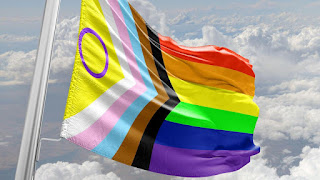Safety - a reflection for Pride month
When I was a younger chap, just embarking on my drinking career, I used to meet my friends in a pub that was next door to the rugby ground. It was a large, popular pub, traditionally laid-out with public bar, “best side”, function room and bowling green. It felt good to be part of something that was both grown up (lots of people older than me drank there) and youthful (it was very popular with local sixth-formers). You didn’t really need to arrange to meet friends there; we got to know each others’ routines and could reasonably expect to find someone to drink with every weekend. Having been lonely in my later school years, this was a very positive and affirming environment for me. However, something I learned early on was to suppress certain of my natural behaviours: lower the tone of my voice, keep my hands from flapping, avoid “un-manly” topics of conversation… To be fair, I had learned this in school, where I was shunned by peers who didn’t want to be associated with someone perceived to be gay. To discover a new community in the pub, only to realise the same unspoken rules applied there as in the school playground was quite a blow. I didn’t even believe I was gay at the time but knew it was important to make sure nobody else thought I was.
Moving to the big city to attend university, I found out there were such things as “gay pubs” but, assuming they were solely places to meet for romantic or sexual encounters, didn’t venture near one for the first couple of years. When I did first venture out (on my own and terrified), my first feeling was one of freedom. Here was somewhere playing music I loved, somewhere I really could “dance like no-one was watching.” If I’d danced like that in a mainstream club, it wouldn’t be long before people were watching, and in the hard, macho environment of a northern, working-class city, to be noticed as gay would not be safe.
 |
I still drank with straight friends in their locals. From Sunday to Thursday, I sat on my hands, dropped my voice and talked about politics or TV, but at the weekends I was myself. Reacting to the antagonism we felt outside the queer world, we embraced hedonism. Because these bars and clubs were the only place we could meet openly, though, they also became our community centres. Here we could access the health information we needed – information we’d be condemned elsewhere for needing. It wasn’t just information available, either: many clubs kept a bowl of free condoms on the bar. I wonder how many men are alive today because of those condoms and leaflets. Free newspapers like The Pink Paper, available in every pub and club, kept us in touch with national news that affected us, which facilitated the development of stronger political activism towards equality. It was in the bars that we planned our trips to Pride. There was only one Pride event at the time, a march through London and concert afterwards. We generally travelled down on public transport and, in the days before mobile phones, had to arrange beforehand where and when to meet up. Most clubs maintained a notice board, where you could advertise events, rooms available or wanted, support groups and – sadly – the loss of friends.
The world has moved on considerably since I was 25, and young LGBT+ people feel less need to be protected in pubs and clubs. The advent of phone apps has obviated the need to meet up in person for romance and sex, and many of the old pubs and clubs have been deserted. Perhaps we have finally reached a time when we don’t need separate pubs for queer people to feel safe. All is not perfect, though. The campaigning group Stonewall reports that:
• One in five LGBT people have experienced a hate crime or incident because of their sexual orientation and/or gender identity in the last 12 months.
• Two in five trans people have experienced a hate crime or incident because of their gender identity in the last 12 months.
For those of us who work in hospitality, it is sobering to learn that one in six LGBT people (17 per cent) who visited a café, restaurant, bar or nightclub in the last 12 months have been discriminated against based on their sexual orientation and/or gender identity. Where do those people go today to find a safe, encouraging community? I wonder how many bar staff would feel confident addressing a situation of harassment or discrimination, or how many of our customers would be confident reporting it to us.
Ask for Clive (https://askforclive.com/) is a charity that provides support and training to venues, to ensure LGBT+ people can meet and socialise with the same safety as their straight friends. In addition, Licensing SAVI (https://www.licensingsavi.com/) is a tool you can use to assess where you need extra support in meeting the objectives of the Licensing Act 2003 with regard to vulnerable groups. Displaying rainbow flags and hosting Pride events can be a great way of communicating your welcome to potential LGBT+ customers, but you want those customers to return after the end of June. A clear commitment to their safety might be the best way of making that happen.





Comments
Post a Comment